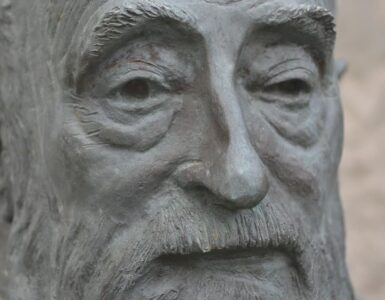Early in World War II, Nazi Germany defeated and occupied the country of France. One day a German soldier, a devout Catholic, went into a small village church for Mass; aside from the French priest, he was the only one there. In those days, of course, Mass was said in Latin, and the priest had his back to the people. When Father said the prayers aloud, he was delighted to hear someone respond in Latin; usually no one came to his daily Mass. He had no idea who was there that morning until it was time to distribute Holy Communion. The priest was shocked and offended to discover a German soldier—the enemy—in his church; instead of giving him Communion, he abruptly turned away and ended the Mass. In that instance, worldly anger and hatred defeated the Gospel.
A quite different situation involved a Catholic priest, Father Frederick Wunderlich, who enlisted in the German army as a chaplain. He was sent by his superiors to the French city of Verdun as a liaison between the victorious Germans and the French people, and he worked closely with the local officials to obtain scarce food, medicine, and fuel for the villagers. Many years later, Father Wunderlich—by then a bishop—was on vacation in France, and decided to visit Verdun; he wanted to see if the French mayor, with whom he had worked closely during World War II, was still alive. When he knocked on the door, an elderly man opened it, and immediately exclaimed, “Captain Wunderlich! You have returned—welcome to my home!” Then he embraced him, and the two old enemies—who were actually now like old friends—spent the afternoon visiting and reminiscing about their time together during the war (William J. Bausch, Storytelling the Word, p. 124). As the first example shows, forgiving one’s enemies is not an easy thing to do, but as we see in the second example, it is possible. Patriotism of course means loving our own country, but it does not require us to hate our enemies. The Kingdom of Heaven transcends, or rises above, all worldly divisions—and if we wish to enter it when we die, we must try to relate to everyone in a spirit of respect, reconciliation, and love.
In his First Letter to the Corinthians (15:45-49), St. Paul contrasts the first Adam with the second Adam—namely, Jesus—and he states that we must bear Christ’s image by living according to the values of God’s Kingdom, not those of this world. An important sign of this is a willingness to forgive one’s enemies, as David did in the Book of Samuel (1 Samuel 26:2, 7-9, 12-13, 22-23). Even though King Saul was wrongly trying to capture and kill him, David would not raise his hand against him or try to take vengeance; he was content to leave all judgments to God. In this he foreshadowed Our Lord’s radical message or teaching in the Gospel of Luke (6:27-38). Jesus speaks of loving our enemies, forgiving those who harm us, and praying for those who mistreat us; as He says, if we want to avoid being judged or condemned, we must not judge or condemn others, even when they are in the wrong. This very high standard is impossible to reach on our own, but with the help of God’s grace, all things become possible.
Christ’s teachings are sometimes inconvenient, unpopular, or even controversial—and a very timely example of this involves the efforts of a new presidential administration to defend our borders and deport dangerous illegal aliens and foreign-born criminals. A nation has the right to secure borders, and a duty to protect its citizens from those who would harm them—and it’s no surprise this was one of the biggest issues determining the outcome of last year’s presidential election. A number of innocent citizens here in the United States have been threatened, intimidated, physically or sexually assaulted, or even murdered, by violent criminals from other countries—and so it is a good thing these criminals are now being tracked down, arrested, and sent back as prisoners to their own homelands. As Americans, we have the right to support and cheer such efforts—but as Christians, we do not have the right to hate or despise the guilty parties. Even as we pray for their victims, Jesus also wants us to pray for these evildoers; it’s the Lord’s desire that they repent and be saved—and so this must be our desire as well.
Is this easy? Of course not. If I were asked to hear the confession of a foreign-born murderer, terrorist, or criminal, it wouldn’t be easy for me; I suspect I’d experience an intense inner spiritual war: a desire to do my duty as a priest, on the one hand, and a strong feeling of loathing and disgust toward the criminal, on the other. Because of my human weakness and my understandable anger on behalf of the innocent victims, I wouldn’t be able to follow the teaching of Jesus in this regard on my own; I would certainly need God’s assistance. I can only hope that in such a situation, I would be honest enough to admit that need, and humble enough to request that help.
Chances are most of will never have a firsthand encounter with a violent criminal, terrorist, or other evildoer—and I’m sure all of us pray that’s the case. This example, therefore, is somewhat theoretical or abstract—but almost everyone of us has had personal experiences in which we were treated wrongly and badly, times when our rights were trampled on or disregarded, and instances when people made themselves our enemies by the way they harmed or betrayed us. Jesus wants us to forgive those persons. This doesn’t mean pretending what they did didn’t really matter or hurt us; it doesn’t mean giving them another chance to harm or mistreat us; and it doesn’t mean associating with them, pretending to like them, or acting as if they’re now suddenly our friends. No, we have the right to keep our distance and protect ourselves from those who would hurt or disrespect us. Forgiving them simply means desiring their genuine repentance and their eternal salvation, and sincerely praying that this miracle of grace come about.
I think Jesus was very disappointed with the French priest who put his understandable anger and wounded patriotism above his duty to give Communion to a devout German soldier; I believe Our Lord was very pleased with the German priest and former French mayor who accepted and embraced each other as friends, despite their differences in the war. It’s very obvious which approach to life the Lord is calling us to choose. As Jesus says, “The measure with which you measure will in return be measured out to you.” Let us never forget that we will one day be judged on this basis—and, using God’s grace, let us set our hearts accordingly.





























